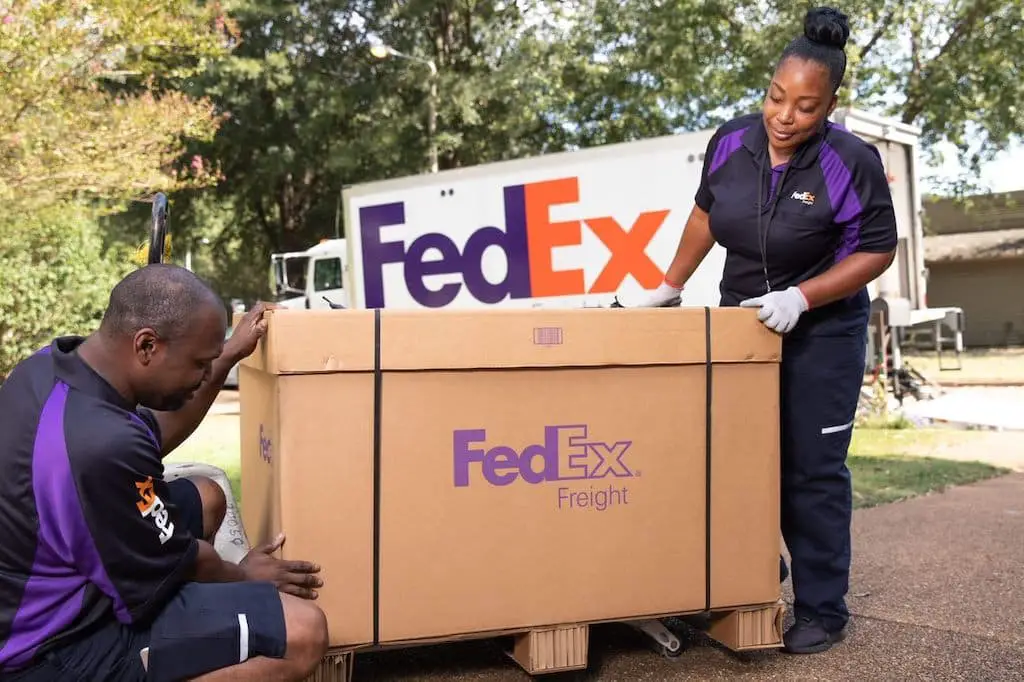FedEx does not use UPS for its operations or deliveries. Both FedEx and UPS are direct competitors in the logistics industry, each with distinctive business models, service offerings, and operational strategies. While they have collaborated in times of need, such as natural disasters or system failures, they do not have a long-term collaboration agreement due to competition, antitrust laws, and the potential for brand dilution.

Why FedEx Does Not Use UPS
1. Separate Business Models of FedEx and UPS
FedEx and UPS compete directly with each other. While both are leading players in the logistics industry, they have distinct business models. They have modeled their operations based on specific market segments they want to target. Each company has a unique management approach and corporate culture to influence how they run their own business.
2. Differences in Service Offerings of FedEx and UPS
While both offer equivalent services like ground shipping, international shipping, express shipping, and so on, they differ significantly in their service features. Almost all comparable services have different prices, coverage areas, delivery options, and add-on facilities. So, many of their services will look similar, but they are not the same. They have tailored their services according to their customer’s needs.
3. Differences in Operational Strategies of FedEx and UPS
Both companies have different visions and business objectives. Their operational strategies are aligned according to their distinct visions and objectives. Hence, their operational strategies differ from one another. While FedEx has built a larger network in the global market, UPS has built an extensive ground delivery network in the United States. Both companies invest heavily in their facilities, vehicles, and other resources. They deploy these resources strategically to optimize their market reach.
What Services Does FedEx Provide That UPS Does Not?
Here are a few services that UPS misses out on. FedEx offers these exclusive services.
FedEx Freight
FedEx Freight comes with various shipping offerings, including a less-than-truckload (LTD) shipping service, eliminating the need to book an entire truck for transportation. Budding businesses required to ship large and heavy packages can benefit a lot from this freight service.
FedEx Custom Critical
The FedEx Custom Critical is a specialized shipping solution for high-value items that require good care and expedited shipping. This service offers features such as secure compartments, temperature-controlled transportation, and delicate handling of high-value goods.
FedEx SameDay
The FedEx SameDay service is highly useful for urgent shipments that require delivery on the same day. This time-critical shipping option is offered by FedEx 365 days a year. As of now, the service is operational within the United States and certain international locations.
What Services Does UPS Provide That FedEx Does Not?
A few of UPS’s services are unique to the company. Let us check them out:
UPS Mail Innovations:
This service is designed for businesses. It provides a cost-efficient shipping solution for high-volume shippers, particularly businesses shipping lightweight packages. The UPS Mail Innovations service is offered in collaboration with USPS for the final mile delivery.
UPS My Choice
Under this service, several options are provided to enhance customer experience, such as changing the delivery time, rerouting packages, receiving delivery alerts, authorizing signature release, and holding the package at FedEx.
UPS Carbon Neutral
This is an environmental-centric service aimed at reducing carbon footprint. To offset the carbon emissions involved in the product delivery process, UPS invests in suitable projects that support environmental sustainability.
The Relationship between FedEx and UPS
1. Competition Between FedEx and UPS
Both companies compete in a relatively low-profit margin industry. Since their target audience is the same, the competition between them is as intense as it can get. To stay on top, they make continuous efforts to gain new customers while retaining the old ones by meeting their needs efficiently.
The intense competition has pushed them to continually innovate and better themselves, which has helped the logistics industry grow exponentially. They have invested heavily in technology, transportation, distribution networks, and other important aspects of the logistics business, making their services more reliable and efficient.
2. Collaboration Between FedEx and UPS
They have collaborated during times of dire need. Unanticipated events like natural disasters, system failures, peak season surges, etc., have forced them to put in joint efforts to provide uninterrupted service. However, these collaborations were situation-specific. The companies do not have a direct long-term collaboration agreement between them.
Since they are direct rivals competing for the same market share, collaboration could potentially mean a loss of business to at least one of the two companies. Joining hands could also mean conflicts in existing customer expectations and loyalty. Moreover, working together can raise security concerns regarding data and package confidentiality.
Furthermore, some countries have strict antitrust laws and regulations that forbid competing companies from joining hands. The rationale is that collaboration between leading players in the industry can create a market monopoly situation, which can eventually harm consumers.
Not to forget the fact that both are big names in the shipping industry with a massive customer base. Over the years, they have spent a lot on building their brand image to reach where they are today. Collaborating could potentially mean diluting their individual brand name, which took them endless years to build.
Choosing Between FedEx and UPS: Factors to Consider
1. Cost
If we compare the shipping rates between UPS and FedEx, UPS charges less for most services, including overnight shipping service. That said, UPS uses different weight formulas to compute domestic and international shipping prices, which influences the final price. Their prices are usually higher than FedEx for larger and heavier domestic shipments.
2. Delivery Speed
FedEx specializes in express transportation services. The company offers various time-critical delivery services to meet the needs of customers requiring urgent delivery. While UPS offers equivalent time-sensitive delivery services, FedEx offers a wider range of express services. Whether it’s same or next-day delivery, FedEx gets the job done better than its rival.
3. Customer Service
Fortunately, both companies take customer grievances seriously. They strive hard to provide an amazing customer service experience. Their representatives are easy to reach via phone, email, or chat. They also have an excellent network of drop-off locations, making it convenient for customers to drop their packages without traveling too far.
Better still, they provide detailed tracking information to offer a seamless customer service experience during product transportation. Mobile apps are also available to track, manage, or schedule deliveries. In a nutshell, both companies are equally matched in this area of service.
4. Coverage
UPS has a better presence in the United States. Credit for this goes to its large fleet of ground vehicles. On the other hand, FedEx has a strong international presence because it has more dedicated air fleets to cater to the global market. Of course, both companies are working hard to improve their existing market coverage and delivery capabilities.








